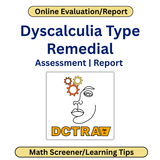Dyscalculia Type Remedial Assessment | Test For Kids, Teenagers & Adults
Only purchase one assessment at a time on this page, as the evaluation will begin immediately after payment.
Two Ways to Purchase - Scroll down.
Unlock the true potential of your learners with dyscalculia with my web-based assessment which requires purchase for each use and generates customized reports.
What is the DysCalculia Type Remedial Assessment (DCTRA)?
The DCTRA (for ages 7+) offers an affordable and quick web-based assessment that generates customized reports to assist parents, educators, professionals, and schools to:
- Assess the potential for a dyscalculia diagnosis.
- Categorize the specific type of dyscalculia present.
- Reveal targeted remedial strategies.
- Offer teaching recommendations.
- define reasonable accommodations.

Features of the DCLRA:
- Comprehensive DysCalculia Type Identification: The DCLRA specializes in determining the specific type of dyscalculia, examining eight areas.
- Detailed Reports and Remedial Resources: Each assessment produces an in-depth report that includes visual data, thorough explanations, and links to remedial resources and suggestions to help guide the remediation process.
-
One-Time Purchase or Bulk Purchases: Buy a single assessment on this page, or schools, organizations, and centers that want to buy multiple assessments can use an online portal for assigning, organizing, and viewing results. Go to the bottom of the page for a sign-up link.
Additional Learning Resources:
For those seeking to deepen their understanding of dyscalculia, the DCTRA offers a range of educational materials and teacher training resources to enhance knowledge and instructional practices.
Benefits of Using the DCTRA:
- Pinpoint Reading Challenges: By identifying one's specific type(s) of dyscalculia, the DLTRA enables targeted intervention, making it easier for educators and therapists to tailor individual learning needs.
- Visual and Detailed Feedback: The visual reports and detailed feedback provided by the DLTRA help clarify the nature of the dyslexic challenges faced by individuals, facilitating a clearer path to improvement.
- Enhanced Group Insight: The partner portal's capabilities to assign reports and organize groups can significantly benefit schools, practices, and centers.
Defining the Types of Dyscalculia
- Verbal Dyscalculia: This is when it's hard to understand and talk about math. It's like your brain has trouble turning math ideas into words and understanding math when someone explains it out loud. You might find it tricky to explain how you solved a math problem or understand math words in story problems.
- Lexical Dyscalculia: This is when it's difficult to read math symbols and numbers. It's like your brain has trouble recognizing what math signs mean or reading big numbers. You might mix up math symbols or find it hard to read number words like "seven" or "twelve."
- Graphical Dyscalculia: This is when it's challenging to write down math problems and symbols. It's like your hand and brain have trouble working together to write numbers and math signs correctly. You might reverse numbers when writing them or have difficulty copying math problems from the board to your paper.
- Operational Dyscalculia: This is when doing math calculations is really hard. It's like your brain has trouble figuring out which math operation to use (like adding or subtracting) or how to do the math steps correctly. You might make mistakes in simple math problems or get confused about which math sign to use.
- Ideognostic Dyscalculia: This is when understanding math ideas is tricky. It's like your brain has trouble grasping what math concepts mean. You might find it hard to understand things like fractions, place value, or why we need different types of numbers.
- Practognostic Dyscalculia: This is when it's hard to connect math to real-world objects and situations. It's like your brain has trouble seeing how numbers relate to things you can touch or see. You might find it difficult to estimate amounts, measure things, or quickly recognize how many objects are in a small group without counting.
- Sequencing Dyscalculia: This is when working with number patterns and order is challenging. It's like your brain has trouble seeing how numbers follow each other or understanding number order. You might find it hard to count by 2s or 5s, or to put numbers in order from smallest to biggest.
- Memory-Related Dyscalculia: This is when remembering math facts and steps is really difficult. It's like your brain has trouble holding onto math information. You might struggle to remember your times tables, basic addition facts, or the steps to solve different kinds of math problems.

Visual Reports & Targeted Resources
- Clear and Comprehensive Reports: Receive detailed reports with analytics, explanations, strategies, and more.
- Actionable Resources: Access valuable resources for targeted remediation.
View a Sample Report
Purchase Options:
Single Purchase:
- Purchase the assessment by selecting the purchase button on this page.
- Take the assessment
- Receive an immediate, comprehensive report with analytics, remedial recommendations, as well as teaching and product recommendations.
- Receive an email with a copy of the report. *Check Spam if it’s not in your inbox.
Partner Portal (multi-purchase): for Practitioners and Organizations:
Once you have created your partner portal, this is the sign-in link: https://drericawarren.brilliantassessments.com/
To sign up for the partner portal, follow the steps below:
- Create your partner portal by going to: https://drericawarren.brilliantassessments.com/Organizations/Initiate.
- Receive an email with your login setup. *Check Spam if it’s not in your inbox.
- In your portal, purchase discounted allotments of 5-1000 assessments.
- Allocate and share the assessment in the partner portal and complete the assessment.
- Receive an immediate, comprehensive report with analytics, remedial recommendations, as well as teaching and product suggestions.
- Test taker and administrator (optional) receive an email with a copy of the report. *Check Spam if it’s not in your inbox.
- Use your partner portal for data comparisons, purchasing assessments, and allocating credits.












